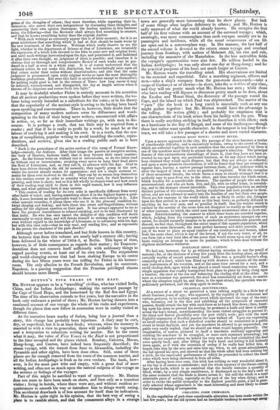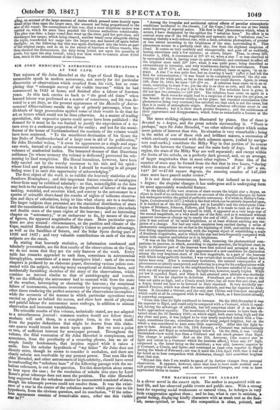HUTTON ' S FIVE YEARS IN THE EAST.
MR. MUTTON appears to be a "travelling" civilian, who has visited India, China, and the Indian Archipelago; making the outward passage by the Cape of Good Hope, and the homeward by the Red Sea and Egypt. The time of his observation extends to five years, but the narrative in the book only embraces a period of three ; Mr. Hutton having thrown into a continued account of one voyage the whole of his visits and experiences, though the places that now follow in succession were in reality visited at different times.
As the narrative bears marks of fusion, being less a journal than a story, this change has probably been injurious. A diary may be curt, dry, or superficial, but it is at least fresh; whereas, when the memory is resorted to with a view to generalize, there will probably be vagueness, and a temptation to substitute writing for matter. But be the cause what it may, the value of Fire Years in the East is not proportioned to the time occupied and the places visited. Bombay, Calcutta, Macao, Hong-kong, and Canton, have indeed been frequently described; the steam voyage, with the transit from Suez to Alexandria, including the Pyramids and other sights, have been done often. Still, some of these places are far enough removed from the route of the common tourist, and all the Indian Archipelago is fresh as its own verdure. The book, how- ever, is for the most part trite and empty, with a great deal of mere writing, and often not so much upon the natural subjects of the voyage as the notions or feelings of the voyager.
Part of this might be ascribed to want of opportunity. Mr. Hutton does not seem to have been much on shore, and then only as a transient visiter ; living in hotels, where there were any, and without resident ac- quaintances to smooth his way or introduce him to things worth seeing. This accidental drawback is of less account for itself than its indications. Mr. Hutton is quite right in his opinion, that the best way of seeing a place is to ramble about, and that the commonest alleys in a strange
town are generally more interesting than its show places. But lack of some things often implies deficiency in others ; and Mr. Hutton is sadly unaware of what the world already knows. He occupies the first half of his first volume with an account of the outward voyage; which, seemingly, was more commonplace than such voyages usually are in its passengers and incidents, while all the usual occurrences of sea life are span out in a commonplace way. In like manner, the last half of the second volume is devoted to the return steam voyage and overland journey from Bombay, with notices of Mehemet Ali, his rise and rule, including the massacre of the Mamelukes. In the less untrodden fields the voyager's opportunities were also • few. He seldom landed in the Indian Archipelago; he was only about one day at Hong-kong; and for the practical purposes of his book not much longer at Canton. Mr. Hutton wants the travelling mind. His observations are limited to the external and superficial. Take a marching regiment, officers and men—take a ship's company from the gun-room downwards—take a cargo of Cockneys or of clowns—in short, take the ot eroXXot of any class, and they will see pretty much what Mr. Hutton has seen ; while those who have reading will digress to discourse pretty much as he does, about the Exodus and Mount Sinai' the discovery of the passage round the Cape, and the island on which Paul was shipwrecked. The matter of the "yarn" (for the book is a long yarn) is essentially such as any one might gather together : but Mr. Hutton would have the advantage in the telling. He writes glibly ; and probably the emptiness that is one characteristic of his book arises from his facility with the pen. When there is really anything striking in itself, he describes it with effect; such as a hurricane in the Bay of Bengal, and some of the landscapes—though these last rather want specific character. As the tempest is too long for ex- tract, we will take a few passages of a shorter and more varied character.
CHINESE BOAT TOWN: CANTON RIVER.
Upon a nearer approach to the city, the passage of the river becomes a matter of considerable difficulty, and is excessively tedious, owing to the crowd of boats; which are collected together in such numbers that the scene presented by them is one of the novelties most likely to attract the stranger's attention. The principal feature of this extraordinary assemblage of boats is, that they have not been at- tracted to one spot upon any particular business, or for any object which having been obtained they would again disperse, but that they are always so collected; and upon a more attentive examination, it will be found that they are arranged in regular lines, leaving a narrow passage between them, of just sufficient width to allow the largest of them to move its position if requisite. With the exception of these occasional breaks, the whole forms a mass so closely arranged that it is perfectly easy to pass from one to the other, and thus traverse the whole extent, which reaches for a considerable distance. The number of people who are thus accommodated, and who are born, live, and die, with no other home, is astonish- ing, and to the stranger almost incredible. This river population form an entirely distinct portion of the community, having regulations and laws peculiar to them- selves, and are not allowed to marry into the families of any but their own people. There are few customs in the world which are so likely to strike the foreigner upon his first arrival in a new country as this boat town; so perfectly different to anything he has ever seen, and so peculiar in itself, that the wonder which Is excited by the novelty of the scene does not disappear so readily as the generality of other customs, to which the mind soon becomes accustomed after a short resi- dence. Notwithstanding the manner in which these boats are crowded together, which, judging from the consequences of such an occurrence amongst our own nation, we should naturally imagine to be productive of interminable quarrels and discord, we find that, throughout the entire mass of this aquatic population, which amounts to some thousands, the most perfect harmony and order prevails. And yet, if we were to place an equal number of our countrymen and women, taken from the same class, which is one of the lowest, if not the very worst, of all, we can form but a very faint idea of the scene that would ensue upon any one of the boats making an attempt to move its position; which is here done without the slightest disturbance whatever.
PORTABLE SHOP: CANTON.
We had not, however, far to go without having occasion to use the pencil of memory; for, at the distance of a very few yards from the landing-place, an object certainly worthy of record presented itself. This was a portable barber's shop, consisting of a stool, which was fitted up with drawers to contain all the neces- sary instruments of his vocation, and at the same time served for a seat, and a small chafing-dish, upon which was placed a small vessel containing water. This simple apparatus was readily transported from place to place by being slung upon a bamboo, the stool at the one end balancing the chafing-dish at the other. As soon as a customer was perceived, the stool was immediately set down, no matter where the situation might be and there, in the open street, the operation was ex- peditiously performed, and the shop again in motion.
CELESTIAL MOUNTEBANKS.
At a corner of a street we perceived a man talking angrily to a little boy of about fourteen years of age; who appeared, by the rapidity of his utterance and various gestures, to be making some retort which increased the rage of the man; who, becoming red in the face and exhibiting all the symptoms of excessive passion, finally struck the boy with such force as to knock him down then, kneel- ing upon his arms to prevent his moving, he produced a knife and drew it swiftly across the boy's throat, notwithstanding the most violent struggles to prevent it: the blood now flowed plentifully over the poor child's neck; and with the most frightful expression of fiendish passion the man walked off. Upon our expressing no small surprise that such a diabolical murder should be committed in a public street in broad daylight, and yet the murderer be allowed to go unpunished our guide very coolly replied, that we should see what would happen presently. Our imagination, of course, pictured to itself a mandarin suddenly appearing and ordering the murderer to be strangled, or some such summary proceeding; but what was our surprise when we beheld the very man who had committed the deed come quietly back, and, after lifting the boy's hand and letting it fall listlessly down again, as if with the intention of seeing if he really had killed him, at length take him by the arm and raise him up; when, to our great astoniehment, the lad opened his eyes, and showed us that the whole affair had been nothing but a trick, for the successful performance of which he proceeded to collect the small coins which were being showered in from all sides. After having been once seen, this trick has nothing so very wonderful about it, as the boy is of course a confederate; and the whole mystery of the throat-cnttirg lays in the knife, which is so contrived that the handle contains a quantity ot blood, whish, by a very simple contrivance, is discharged on to the boy's neck at the same moment that the blade is drawn across it: but still the whole is a most admirable piece of acting, especially on the part of the boy when dying; and in order to excite the public sympathy to the highest possible point, a lad is gene- rally selected whose appearance is the most interesting and most likely to create the strongest feeling of compassion.
CHEATING JOHN CHINAMAN.
In the regulation of port-dues considerable alteration has been made within the last few years, but the old system had an inevitable tendency to encourage smug' gling, on account of the large amount of duties which pressed more heavily upon mall ships than upon the larger ones, the amount not being proportioned to the size of the vessel: the consequence of this was, that a most iniquitous system was carried on, which for some time puzzled the Chinese authorities considerably. The plan was this: a large vessel hrst went up the river, paid her port-dues, and discharged her cargo; which being cleared, another vessel came alongside during the eight, transferred her cargo into the larger one, and hauled off again before daylight; on the following day this was again discharged into the boats as part of the original cargo, and so on to the extent of fourteen or fifteen vessels, who thus cheated the Government, the duty being levied, not upon the quantity of goods, but upon the ship herself; which was thus made to contain about 8,000 toes, much to the astonishment of the Chinese.



























 Previous page
Previous page